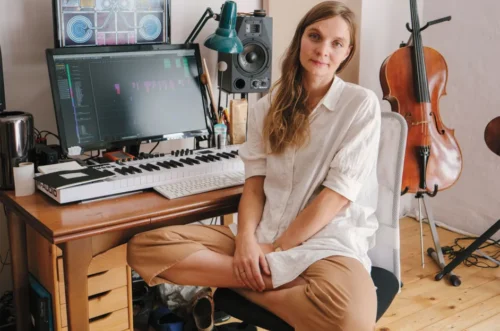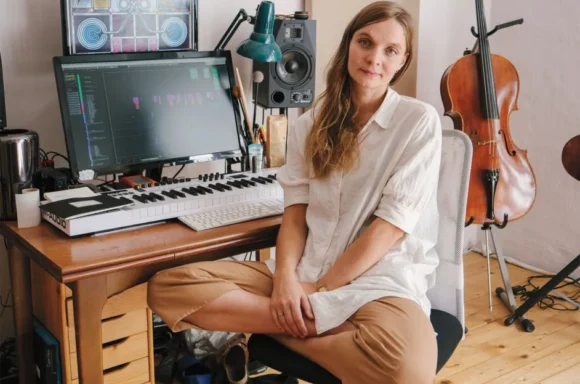 United Kingdom Hildur Guðnadóttir in Concert: Hildur Guðnadóttir (trench cello), London Contemporary Orchestra / Robert Ames (conductor). Queen Elizabeth Hall, London, 26.3.2025. (CC)
United Kingdom Hildur Guðnadóttir in Concert: Hildur Guðnadóttir (trench cello), London Contemporary Orchestra / Robert Ames (conductor). Queen Elizabeth Hall, London, 26.3.2025. (CC)

Hildur Guðnadóttir – Tár (Allegro); Opaque from Without Sinking; Vichnaya Pamyat from Chernobyl; Líður from Saman; Fólk fær andlit (People get Faces); Pipes; Confession from A Haunting in Venice; Opaque from Without Sinking; Joker 2
Anna Ϸorvaldsdóttir – Tár: Ro
Mica Levi – Love from Under the Skin
David Lang – Just (after Song of Songs)
Hildur Guðnadóttir is an Oscar-winning composer and performer who hails from Iceland. She has triumphed not only at the Oscars, but also at BAFTA and the Golden Globes, plus has been awarded two Grammys.
She curated this programme specifically for the London Soundtrack Festival 2025. Guðnadóttir also played a trench cello, a sort of box cello used in the trenches that is easily assembled; it is made of plywood and was also originally used to transport bullets.
While Guðnadóttir is probably best known for her music for the Joker films, but surely amongst musicians it is the film Tár that stands out. Guðnadóttir’s music is daringly sparse: the first piece, Largo, initially pits a pair of violins against a pair of violas in almost Minimalist fashion; she adds layers as the piece progresses. The Allegro that follows is surely Guðnadóttir’s answer to Stravinsky’s Soldier’s Tale in its gritty march. The piece includes imitations of an alarm (elated to the film’s action). The musicians of the London Contemporary Orchestra excelled in their complete understanding of this music, as with the music of Glass. It takes a particular mindset to enable the music to succeed. A final Moderato throbs gently.
Many of Guðnadóttir’s core traits seem exemplified in Tár: a sense of timelessness and regret, and a sense of sound that is icily beautiful. Obsessive repetition is there, too, and reappeared in the bass of ‘Opaque’ from her album Without Sinking. Whether heard on the immersive sound available to headphones or in live performance at the Queen Elizabeth Hall, the effect is heady indeed. A mere four minutes creates a web of sound; and, for all the references to Minimalism, Guðnadóttir’s music has a voice of its own hewn from complex harmonic movements and collisions.
The music to the TV series Chernobyl again changes tintà without moving techniques too much. Listen to ‘The Door’ with its grinding gestures and its deliberate inclusion of static (not performed at the concert, but on the same album). The choral piece ‘Vichnaya Pamyat’ seems to exit time and which, especially in its super-low basses, seems to invoke Orthodox Church music; spatial effects enhanced the brief but stunning ‘Liður’ from the album Saman. From the 2023 Agatha Christie film A Haunting in Venice came ‘Confession’. This promises to be Christie as you have never seen or heard her before: the music is halting, even spooky in its gentle pulsings against which long legato lines play out, often with little vibrato, leaving them emaciated, fragile.
Composed of a deeper resonance is Fólk fær andlit (People get Faces) and some readers may know Emily d’Angelo’s remarkable performance on DG; this was even more powerful in the hall.
The concert ended with music from Joker 2, wherein Guðnadóttir played her trench cello to haunting effect. This was unutterably beautiful, a bath of sound surrounding the plangent trench cello, the composer playing it like it was a voice. In between came music by Anna Þorvaldsdottír (with whom Guðnadóttir studied) and David Lang. Again from Tár, Þorvaldsdottír’s ‘Ro’ (2013) is the product of a vast imagination: this is a whole new world, expansive and yet still. The sheer control of the players of the London Contemporary Orchestra is astonishing. And the real surprise of the concert for me was since I have not always been impressed by the music of David Lang, his Just (after Song of Songs), with its insistence on the titular word followed by love-related words and phrases in beautiful harmonies is remarkable. A percussionist underlines the rhythm like some primal reference point. Tremendous.
A most simulating evening. Robert Ames conducted with real understanding of the music throughout.
Colin Clarke
